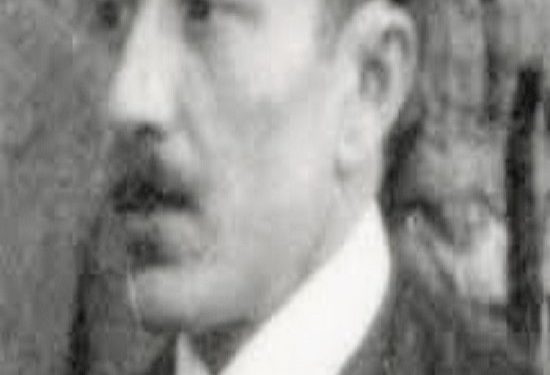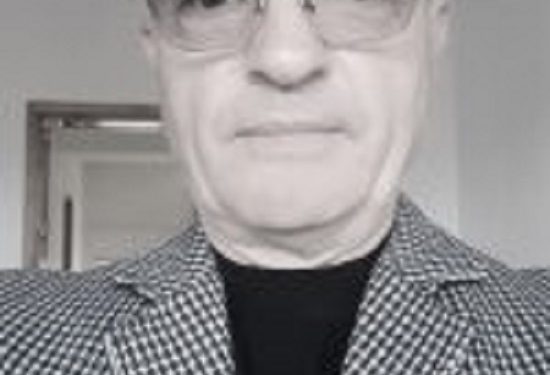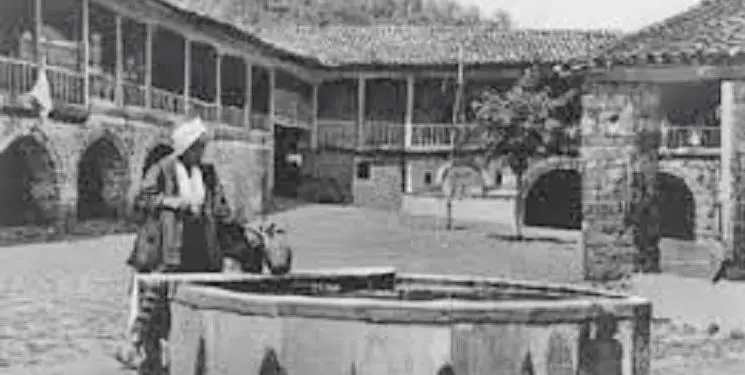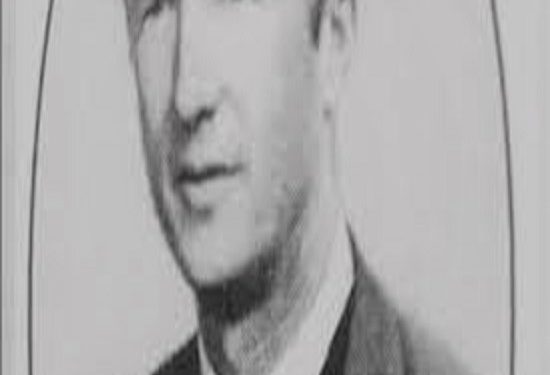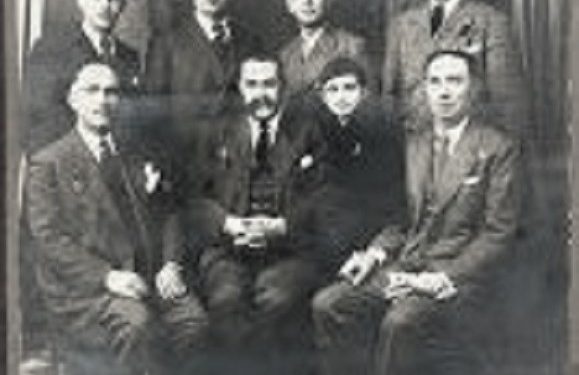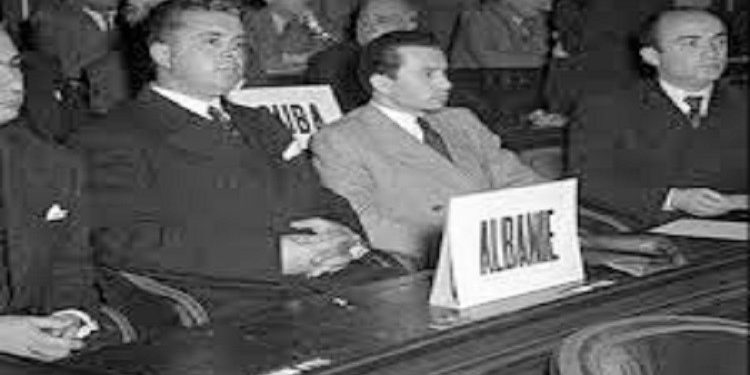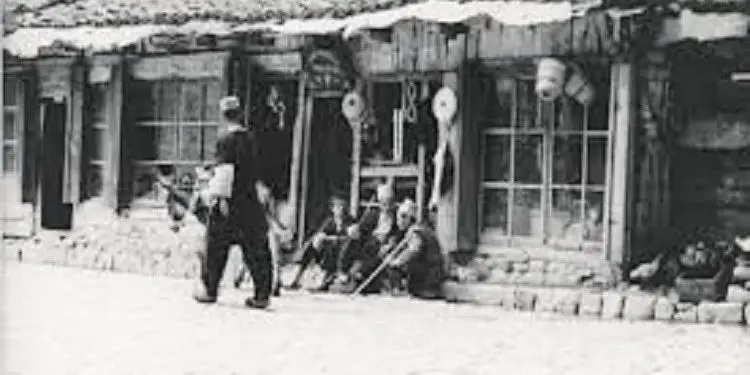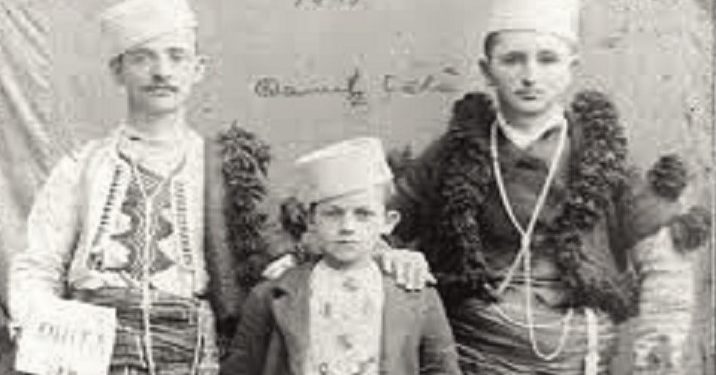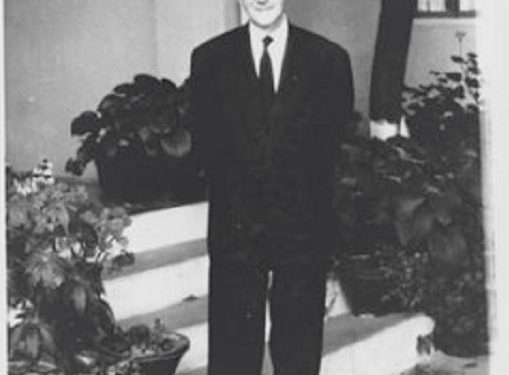Bukurosh Dylgjeri
Memorie.al/ publishes the unknown story of Qamil Çela from Elbasan, otherwise known as Qamil Çelirama, former secretary of Fan Noli in the government of ’24 and then one of the first communists in Albania with Ali Kelmendi, etc. , who with the return of Zog to power left the country and stayed in emigration as an anti-Zogist, where he cooperated closely with KONARE. His return to Albania in 1945, where he was first appointed as the President of the Red Cross in Tirana and then as the Director of the Library of the city of Elbasan, from where he was removed because he did not accept that in the model of the book of History of Albania, Haxhi Qamil to be considered a patriot. His early retirement and abandonment by the communist regime, as he refused to write about “Enver Hoxha’s revolutionary activity in France”, saying: ‘he did not know about such’?!
Many of us well remember the last twenty years of the last century, when early in the morning crowds of workers with bread (food) wrapped in newspaper under their armpits, ran ready to pick up the buses that would take them sent to work in metallurgy, cement factory, wood mill, etc. In this multitude of workers dressed alike, in overalls or blue jeans all over with grease stains, an old man in his 70s stood out, with a long, slender body and slightly bent. He dressed quite gracefully, in a dark gray suit and vest, snow-white shirt and collar, constantly wearing borsaline on his head, while his shoes were always polished.
He seemed (and was in fact) an elegant nobleman who is unknown why he had survived that tragic and surreal reality. He did not rush like the others, he walked slowly with light and rhythmic claws. He kept his head down a little and did not talk to anyone, no one greeted him. He followed his ritual of many years of morning walk from Gurabardhja where he had his house, to the olive grove. At Qoshja he paused for a moment, read the posters announcing his fellow citizens who had passed away, sighed lightly, and continued on his way to the right. With the same step, without speaking and without being greeted by anyone, he followed the road to the Zaranika Bridge and from there climbed the olive grove to the Teqja. There he stopped, sat for a while, and rested for a few minutes, gazing at his hometown below.
Returning home was the same, with that step, without talking and without greeting acquaintances. He entered the house and never left. No one visited. It was absolutely numb from that time. I was lucky enough to know this man up close because we had the houses next door. He was not only a neighbor, but also a distant friend and cousin to my father. His name was Qamil Çela, also known as Qamil Çelirama. He rarely came to us in the afternoons and talked to my father. He never married and was cared for by his sister Razije and grandchildren Hysni and Behije Sefa.
Qamil Çela in Elbasan was probably the last renaissance to have survived the post-war era. The main feature was patriotism perfectly combined with origin, cultivation, activity and above all honesty. With an iron character, stoic, rebellious, complicated and consistent in his ideals. A humane and idealistic communist, an unwavering patriot and a staunch enemy of the unjust distribution of wealth.
He was born in Elbasan in 1896 in a family with a patriotic tradition. Since the age of 13, he has been leading the protest of the students of the “Ruzhdije” school against learning Turkish. He immediately enrolled in the newly opened Normal and there he met the professors Luigj Gurakuqi, Aleksandër Xhuvani, Ahmet Gashi, the student Avni Rustemi from Libohova, etc. Friendship with them and family formation awakened in Qamili the gene rebellious against injustices. In 1910, the punitive expeditions of Dërgut Pasha against the activists of the Albanian language and independence were launched in Elbasan.
Qamil, only 15 years old, together with Abedin Çaushi and Shefki Xhani will be helping the tortured citizens. Participates in the insurgent detachments of Martanesh and Busheku led by brave captains such as Sheh Hysen Sulavari, Isuf Qosja in Shpat, Dalip Tabaku in Pajova and Sulë Kurti in Shala. This activity was best coordinated with the political leaders Aqif Pasha Elbasani, Ahmet Daklin, Lef Nossi, Pope Jorgji Theohari, Emin Haxhiademi (elder), Hysen Ceka etc. The Declaration of Independence on November 28, 1912 was the biggest celebration for him and will be experienced by Qamil with many different activities.
Qamil Çela would also be active in every event in Elbasan of those years. He is the originator and leader of the first patriotic associations of the Elbasan youth such as “Union”, “Venus”, “Brotherhood”, “Sun”, “Light”. In 1913, all the people of Elbasan rose to their feet to expel from there a renegade named Efrem Gjini, the hierarchy of the Orthodox Church and codos of the Greek Patriarchate. Qamili maintained constant contacts with the Central Headquarters of the Albanian Patriotic Movement based in Elbasan led by patriots such as Grigor Cilka, Hilë Mosi, Mit’hat Frashëri, Dervish Hima etc.
In 1920, after the Congress of Lushnja, he participated in the government cabinet of Sulejman Delvina and settled in Tirana. He was part of the Ministry of Internal Affairs together with the titular Ahmet Zogu and Haki Stërmilli. He took an active part in clearing Serbian agents in the so-called “Republic of Mirdita”, as well as in the south of the country against Greek gangs. As a “free bird” he was, he could not stand the political machinations in the government cabinet and is associated with the opposition of the “Union” organization.
He was supported by many boys from Elbasan, such as Rrapush Bumçi, Ahmet Burburija, Sulë Gjevori, Shefqet Stringa, brothers Abedin and Ali Çaushi, etc. The murder of Avni Rustemi shocks him immensely and then he puts down his weapons and goes to Vlora, where together with the garrison of this city, he leaves for Tirana, crossing Fier, Lushnja, Rrogozhina and from the Peza highlands they descend to the capital. In Noli’s 6-month government he was his secretary.
With the triumph of Legality, he leaves the country and at the beginning of 1925 finds him in Bari, Italy. In the political unrest of the neighboring country, Qamili takes the side of Antonio Gramsci’s socialists. In Bari he was Bahri Omar’s house friend. He leaves Italy before the age of one and goes to Moscow together with Ali Kelmendi, Asllan Pejani, Fetah Ekmekçiu, Demir Godeni, Xhevdet Meqemeja, Ymer Domi, Naum Prifti, Rexhep Filati, Reshat Këlliçi, Reshit Daçi, Sejfulla Malëshova and Seli Shpum , where they attend courses in philosophy and political economy.
The Russian climate damaged Qamil’s health and he goes to Odessa for treatment. He returns to Italy and groups with the Albanian political emigration of the organization “National Union”, becoming an ardent propagandist of leftist ideas. Qamil Çela was also organized in KONARE (National Revolutionary Committee) led by KOMINTERN. Moscow’s clandestine tendencies to seize KONARE’s leadership and Noli’s move away from politics to America led Qamil to retry over leftist views.
A few years later he left Italy and settled in Lyon, France. With the help of friends, he publishes the newspaper “Sazani” and writes social and political articles under the pseudonym “Olive”. During the Spanish Civil War 1936-1939, it will affect the Albanian volunteers from Albania and Kosovo to join the Italian internationalist brigade “Garibaldi” and not the Yugoslav one (especially for the volunteers from Kosovo who were citizens of the Serbo-Croatian-Slovenian Kingdom).
Qamil Çela was against the Soviet idea of a “Soviet Balkans” under Belgrade. The Italian fascist occupation of the country grieves Qamil. I do not remain indifferent and together with Bedri Pejani, Albanian students and economic emigrants there (Mahir Domi, Kole Paparisto, Dhimitër S. Shuteriqi, Ptoleme Xhuvani, Shefqet Ndroqi, brothers Gogo and Kozma Nushi, etc.), as well as with their knowledge and influence to the structures of parties and unions of the French left (Justin Godard, Leon Perret, Maurice Rolland and others), organizes powerful anti-fascist demonstrations in Lyon, Paris, Grenoble and even Switzerland.
In the same year, he meets in France with his sworn enemy King Zog in exile and they cooperate to help financially the Albanian volunteers who leave the end of the conflict in Spain, to be repatriated. In Ali Kelmendi’s funeral speech, Qamili will openly state that “revolutionary” Albanians will fight fascism and chauvinism. After the German occupation of France, he joined the French Communist Party and became a member of the Resistance.
He had connections with the Communist International-III- and with Gjergj Dimitrov himself in the organization of anti-fascist and anti-Zogist compatriots, such as Ymer Dishnica, Sejfulla Malëshova, Thanas Ziko, Kozma Nushi, Manol Konomi, Masar Shehu, etc. This branch of the Albanian left in emigration was determined for national unification after the war, which was not well seen by the Yugoslav internationalists. This political activity of Qamil in Lyon of the government of Vishia, was not liked and according to his recollections, they tried twice to intern him in labor camps in Poland, but in both cases, he was rescued by a German officer who sympathized with our nation.
At the end of 1942, Qamili tried to return to Albania due to the unbearable situation in France. Although he mediated to the Bektashi World Leader, father Ali Rizai, former Prime Minister Mustafa Kruja did not allow it. He continued his activity in France until the end of the war. Through the mediation of his friend Marcel Kashen, who was the head of the French communists, he influenced the French government to be the first Western government to recognize a free and sovereign Albania. During this period, Qamili organized the reception of Albanian delegations at the Peace Conference and met with Enver Hoxha, Hysni Kapo, Tuk Jakova, etc.
He had the first clash with them over the issue of Kosovo remaining under Yugoslavia. With the mediation of Ymer Dishnica, he made a request and returned to his homeland in October 1945, after 20 years away. His return was greeted with seeming pomp, but the coldness of the new rulers was noticeable. His long patriotic activity, formation, influence and friends around the world were also his misfortune, which he soon realized. This return stunned many people he knew very well and knew his “values”. They almost did not say “what the hell did you want to do”?! He was appointed chairman of the Albanian Red Cross in Tirana in a building destroyed by the war, without funds, without tools and with modest staff. The conditions of the common people coming out of the war alive were miserable. He addresses letters of help to Albanian friends and emigrants around the world who respond immediately. He set up popular canteens for free food to the remote provinces, as well as organized medical service at a time when malaria was wreaking havoc.
It was his idea to set up a Red Cross pharmacy on Barrikadave Street in Tirana. All with the help of friends from abroad. Simple, humane and ubiquitous to the point of sacrifice. It was not about class warfare and its staff also included Dervish bej Bicaku with experience in Red Cross affairs. But he felt worse when he saw how his comrades and friends, patriots and fighters, intellectuals and generous peasants, among whom Sejfulla Malëshova, dr. Enver Zazani, Petro Marko, Van Filipi, Ymer Dishnica, Kole Tromara, Sejfi Vllamasi, Bahri Omari etc., etc.
All this valuable work of Qamil Çela was not liked by the leaders of the time because his (previously great) reputation was now taking on frightening proportions for them. They tried to poison him twice but he escaped miraculously. In 1950, he called Enver Hoxha and gave him “the good news that ‘Koçi Xoxe had prepared the guillotine for him, but the party showed the place to the villain Xoxe and from now on Qamil will accept her in its bosom”. Apparently, the dictator was interested in the western format of Qamil Çela.
But it did not take long and after a year he was removed from Tirana and appointed director of the Public Library in his hometown, Elbasan. The whole city went home to meet him and welcome him. So wise and quiet, he waited for them all, listened to them attentively and gave them advice. Frightened by the admiration that ordinary people had for him, the authorities rushed and retired him, as well as appointing him a deputy. In 1958, the leaders of the communist state launched a “bottom-up initiative” to create a model of Albania’s history.
In this model, the participants were served to describe Haxhi Qamil’s movement in 1913 as a peasant and anti-feudal armed movement, the same as Purgachev’s movement in Russia. In fact, Haxhi Qamili from the village of Sharrë in Tirana was just a rebel, ignorant and obsessive who did not know the Albanian nation and the national flag. He “had time left” to father Dovleti and fought and persecuted every patriot and activist of the Albanian language in those turbulent times. (His gangs in Elbasan imprisoned and tortured many patriots from Elbasan, as well as burned the house of Aqif Pasha of Elbasan, which was located where today is the Directorate of Education in the neighborhood “Dyli Haxhire”).
To call Haxhi Qamil a patriot was a national insult. The idea in question was supported by some historians close to the regime. Against this evil current rose three colossi, named: Skënder Luarasi, Abedin Çaushi and Qamil Çela. This infuriated the regime and of course, it would not pass without consequences for those three brave Albanians. The historical model, together with Haxhi Qamil, was left to be reworked.
On the occasion of the 60th anniversary of Enver Hoxha’s birthday, some filmmakers from Tirana went to Qamil Çela’s house and asked him to testify about Enver’s “revolutionary activity” when he was a student in France. Qamil Çela replied briefly that he did not know of such. This response filled the cup and by order from above they stopped paying the pension. The organization of the Democratic Front of the “Partizani” neighborhood where Qamili lived, shouted to the sky against the “enemy and traitor” Qamil Çela.
Yet he was not imprisoned, perhaps by his advanced age or his influence at home and abroad. After 1975, Enver Hoxha tried to soften his attitude towards Qamil Çela by presenting the situation against him as a personal act of Mehmet Shehu. Later, in one of his books (Baraka e Nushajve) he briefly presents the activity of Qamil Çela in France, denigrating him as a “cafe revolutionary”. A few years later, they invented something else as if the blame for the blows against Qamil Çela “turned out” that ‘the Elbasan Party Committee had us’!?
Qamil Çela died on April 5, 1988 and was followed by his relatives, friends and neighbors. It was a simple burial with modest attendance. Maybe people still felt scared. Seeing this participation that actually left much to be desired, a friend of my family named Mehmet Shqerra, who was also a communist member, said through gritted teeth: “Here today in this funeral should have been all of Elbasan, because Qamil Çela who he was sent home, he deserved it “.
In conclusion, I think this article may provoke controversy, but my principle is that we should respect anyone who works and fights for the country, despite the fact that we may have different political opinions. We often applaud people who have received more than they have given, while it is ordinary people who give a lot and do not ask for anything. / Memorie.al




